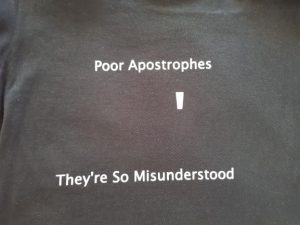I notice apostrophe errors. Like many writers, I silently correct greengrocers’ apostrophes and misplaced possessives, and I put reasonable effort into making sure I dont make the same mistake’s myself.
I’m the proud owner of a t-shirt promoting the Apostrophe Protection Society. Like many word-lovers, I was disappointed this week to hear the Society is closing.
Apparently its 96-year-old founder, John Richards, admitted defeat, claiming that ‘the ignorance and laziness present in modern times have won’. Traffic to the Society’s website had dwindled to almost nothing, and Richards felt people were no longer interested in the humble apostrophe.
Of course, the publicity around his decision to close the Society led to a spike in interest (and publicity). With a 600-fold increase in website demand, the server’s bandwidth was exceeded and the site closed from overuse. Richards’ decision to close the Society has been reversed, and the site will operate again from January 2020.
But … and you’d be expecting a but here, otherwise I’d have nothing to write about …
I’m not sure I agree with Richards when he claims that ‘the ignorance and laziness present in modern times have won’. I don’t agree that our language is in a poor state. And I don’t believe that apostrophe misuse demonstrates the failure of our education system.
The intellectual elite have long complained about the ways that everyday people use English. We regularly hear concerns that the language is deteriorating, people misuse words, and we’re lowering the bar on correctness. People who ‘know’ about grammar and punctuation love to make fun of people who make little errors.
I agree with David Shariatmadari who suggests that claims of linguistic decline are the cultural equivalent of the boy who cries wolf, but the wolf never turns up. [1] Shariatmadari quotes warnings from the 1700s, lamenting the decline of language. On a recent editing podcast, I heard a linguist trace these warnings as far back as AD60.

For me, three issues are important about style and punctuation – and language use more widely:
- Most people worry a lot about style and correctness. In workplace communication, for example, there is an increasing emphasis on organisational style, grammatical correctness, and careful attention to detail. In my experience, most workplaces put a lot of effort into worrying about stylistic consistency, in particular. I have long conversations with workplace writers who are worried about whether they ‘should’ use particular capital letters, indents, heading styles, and so on. A lot of people worry about apostrophes, and in worrying they tend to use them too much.
- Style and correctness may not be central to communication. Don’t get me wrong here: I care about correctness. But there are times when correctness doesn’t really matter, and is better ignored. If a government department or large organisation wants to communicate with me, I expect them to get it right; they’ve got the resources to employ professional writers and proofreaders. If a book is published, I expect it to be correct; publishers have editing resources, and mistakes might detract from the book’s message. But if I’m buying a coffee, I don’t care one bit whether it comes with apostrophes or not. I want to buy my coffee from someone who makes excellent coffee, not from someone who can perfectly place an apostrophe. In these cases, we make ourselves look precious and pretentious when we point out errors.
- Style and correctness are helpful for clear communication, but they’re certainly not sufficient. It’s possible for writing to be fully ‘correct’ from a style and punctuation perspective, yet still fail as a piece of communication. I see style and punctuation as the ‘back door’ of my writing: they’re the things I check last. In some ways, they’re the ‘front door’ for my readers, because if readers notice a silly mistake early, my credibility is likely to be damaged. But if that doorway is blocked by poor thinking and illogical construction, no amount of correctness is going to help. For this reason, checking content and structure are, I believe, more important than checking for correctness.

I have a simple answer ready when people notice mistakes in my work (and, believe me, this happens a bit). I say that I’d like to pretend I inserted the mistake to show I’m not perfect, but this isn’t true: the mistake is genuine. And you can almost guarantee you’ll find a mistake if you really go hunting for one.
- Shariatmadari, S. Why it’s time to stop worrying about the decline of the English language, The Guardian, 15 August 2019. Available: https://www.theguardian.com/science/2019/aug/15/why-its-time-to-stop-worrying-about-the-decline-of-the-english-language.
